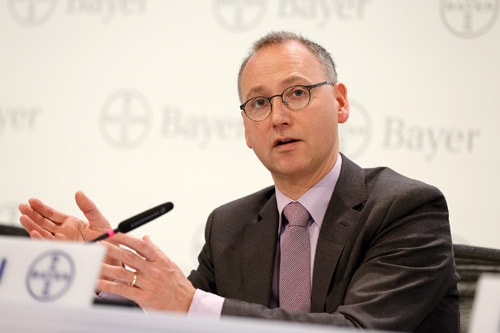
The rise of post-truth politics and the UK’s exit from the European Union are undermining pharma innovation, according to Bayer chief executive Werner Baumann.
Both are “reasons for concern”, given the importance of “reliable and innovation-friendly conditions in our markets”, he told a press briefing on the company’s annual results at its headquarters in Leverkusen, Germany last week.
“For some time we’ve been observing a profound change in the culture of political discourse,” Baumann (pictured above) said. “Unfortunately, objective debate can no longer be expected and emotions are increasingly the substitute for fact.”
“This is resulting in a situation in which decisions are no longer based primarily on rational reasoning.”
The consequent unpredictability is “a severe handicap for innovative companies like Bayer”, given their need for long term planning and investment.
Embodying emotion-driven politics for many is US president Donald Trump, with whom Baumann met last month.
However, the “emotional factor in politics” was not discussed at that meeting, he said, adding that it was instead confined to the future of agriculture and the potential impact in the US of Bayer’s $66bn acquisition of agri-business firm Monsanto.
Although Baumann did not discuss US trade, he added: “We are a globally-acting company and we stand for free and open markets. Limiting free trade will result in all parties losing.”
Brexit, Bayer and pharma
Meanwhile, taking aim at the implications of the UK’s decision to leave the EU, Baumann said: “Europe is experiencing an identity crisis, with centrifugal forces increasing.
“In view of this situation, we need to inject new strength into the European ideal. One thing seems clear, we can’t simply carry on as before. The European Union will have to consider reform if it is to remain attractive in the long term.”
Brexit would need to be managed in such a way as to minimise its negative economic and social effects as much as possible, he added.
“We find it unfortunate that the British government has taken the decision to push for a ‘hard’ Brexit. We are not directly affected at this time because, quite frankly, it is too early – we don’t know what the British regulations will look like, because they have to be transitioned, and that will undoubtedly take some time.”
This transition period before Bayer is able to gauge the effect of Brexit on its business would take ‘multiple years’, but the ability of non-British nationals to continue to work in the UK was ‘worrisome’.
Earlier this year the UK government unveiled a new industrial strategy, in which life sciences will play a key role, but uncertainty persists when it comes to the future role of UK medicines regulator the MHRA and its European counterpart the EMA, the later – for now, at least – still located in London.




